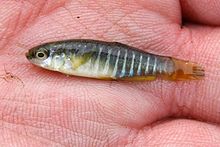Aphanius, commonly referred to as Mediterranean killifish, is a genus of the order Cyprinodontiformes in the family Aphaniidae. They are found in fresh and brackish waters in the coastal plains of the Mediterranean region.
| Aphanius Temporal range:
| |
|---|---|

| |
| Aphanius fasciatus | |
| Scientific classification | |
| Domain: | Eukaryota |
| Kingdom: | Animalia |
| Phylum: | Chordata |
| Class: | Actinopterygii |
| Order: | Cyprinodontiformes |
| Family: | Aphaniidae |
| Genus: | Aphanius Nardo, 1827 |
| Type species | |
| Aphanius nanus Nardo, 1827
| |
| Synonyms | |
|
Lebias Goldfuss, 1820 (invalid name) | |
Taxonomy and systematics
editThere were formerly 39 recognized species in this genus. However, the family Aphaniidae was split in 2020, and species were reallocated to eight monophyletic genera. Several species were reallocated; to five resurrected genera (Anatolichthys, Aphaniops, Kosswigichthys, Paraphanius, and Tellia) and two new genera Esmaeilius and Apricaphanius.[1]
Species
editFollowing the split, there are two valid species:[1]
- Aphanius almiriensis Kottelat, Barbieri & Stoumboudi, 2007
- Aphanius fasciatus Valenciennes, 1821 (Mediterranean banded killifish)
- Fossil species
- †Aphanius crassicaudus Agassiz 1839[2]
- †Aphanius yerevanicus Vasilyan et al. 2009
- †Lebias cephalotes Agassiz 1839
- †Lebias gaudryi Sauvage 1873
- †Lebias gobio Agassiz 1839
- †Lebias meyeri Agassiz 1839
- †Lebias perpusillus Agassiz 1839
Fossil record
editFossils of extinct species, including A. crassicaudatus and A. yerevanicus, are known as far back as the Early Miocene of the Mediterranean and Caucasus regions.[3] are Fossils of Aphanius are found in strata of the Pleistocene of Italy (age range: from 11.608 to 5.332 million years ago.).[4]
References
edit- ^ a b Jörg Freyhof; Baran Yoğurtçuoğlu (July 2020). "A proposal for a new generic structure of the killifish family Aphaniidae, with the description of Aphaniops teimorii (Teleostei: Cyprinodontiformes)". Zootaxa. 4810 (3): 421–451. doi:10.11646/zootaxa.4810.3.2.
- ^ A. crassicaudus at Fossilworks
- ^ Reichenbacher, Bettina; Kowalke, Thorsten (2009-10-01). "Neogene and present-day zoogeography of killifishes (Aphanius and Aphanolebias) in the Mediterranean and Paratethys areas". Palaeogeography, Palaeoclimatology, Palaeoecology. 281 (1): 43–56. doi:10.1016/j.palaeo.2009.07.008. ISSN 0031-0182.
- ^ "†Lebias Agassiz 1832 (ray-finned fish)". Paleobiology Database.